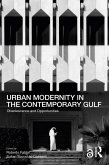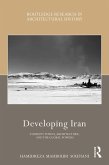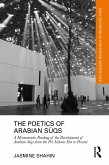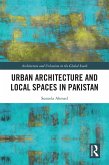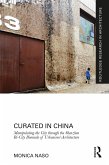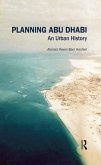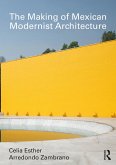Urban Modernity in the Contemporary Gulf (eBook, ePUB)
Obsolescence and Opportunities
Redaktion: Fabbri, Roberto; Al-Qassemi, Sultan Sooud
0,00 €
0,00 €
inkl. MwSt.
Sofort per Download lieferbar

0 °P sammeln
0,00 €
Als Download kaufen

0,00 €
inkl. MwSt.
Sofort per Download lieferbar

0 °P sammeln
Jetzt verschenken
Alle Infos zum eBook verschenken
0,00 €
inkl. MwSt.
Sofort per Download lieferbar
Alle Infos zum eBook verschenken

0 °P sammeln
Urban Modernity in the Contemporary Gulf (eBook, ePUB)
Obsolescence and Opportunities
Redaktion: Fabbri, Roberto; Al-Qassemi, Sultan Sooud
- Format: ePub
- Merkliste
- Auf die Merkliste
- Bewerten Bewerten
- Teilen
- Produkt teilen
- Produkterinnerung
- Produkterinnerung

Bitte loggen Sie sich zunächst in Ihr Kundenkonto ein oder registrieren Sie sich bei
bücher.de, um das eBook-Abo tolino select nutzen zu können.
Hier können Sie sich einloggen
Hier können Sie sich einloggen
Sie sind bereits eingeloggt. Klicken Sie auf 2. tolino select Abo, um fortzufahren.

Bitte loggen Sie sich zunächst in Ihr Kundenkonto ein oder registrieren Sie sich bei bücher.de, um das eBook-Abo tolino select nutzen zu können.
This book offers a timely and engaging discussion on architectural production in the modernization era in the Arabian Peninsula. It is an important reference for academics and upper-level students interested in heritage studies, post-colonial urbanism and architecture in the non-West.
- Geräte: eReader
- ohne Kopierschutz
- eBook Hilfe
- Größe: 10.03MB
Andere Kunden interessierten sich auch für
![Urban Modernity in the Contemporary Gulf (eBook, PDF) Urban Modernity in the Contemporary Gulf (eBook, PDF)]() Urban Modernity in the Contemporary Gulf (eBook, PDF)0,00 €
Urban Modernity in the Contemporary Gulf (eBook, PDF)0,00 €![Developing Iran (eBook, ePUB) Developing Iran (eBook, ePUB)]() Hamidreza Mahboubi SoufianiDeveloping Iran (eBook, ePUB)42,95 €
Hamidreza Mahboubi SoufianiDeveloping Iran (eBook, ePUB)42,95 €![The Poetics of Arabian Suqs (eBook, ePUB) The Poetics of Arabian Suqs (eBook, ePUB)]() Jasmine ShahinThe Poetics of Arabian Suqs (eBook, ePUB)42,95 €
Jasmine ShahinThe Poetics of Arabian Suqs (eBook, ePUB)42,95 €![Urban Architecture and Local Spaces in Pakistan (eBook, ePUB) Urban Architecture and Local Spaces in Pakistan (eBook, ePUB)]() Suneela AhmedUrban Architecture and Local Spaces in Pakistan (eBook, ePUB)42,95 €
Suneela AhmedUrban Architecture and Local Spaces in Pakistan (eBook, ePUB)42,95 €![Curated in China (eBook, ePUB) Curated in China (eBook, ePUB)]() Monica NasoCurated in China (eBook, ePUB)42,95 €
Monica NasoCurated in China (eBook, ePUB)42,95 €![Planning Abu Dhabi (eBook, ePUB) Planning Abu Dhabi (eBook, ePUB)]() Alamira Reem Bani HashimPlanning Abu Dhabi (eBook, ePUB)43,95 €
Alamira Reem Bani HashimPlanning Abu Dhabi (eBook, ePUB)43,95 €![The Making of Mexican Modernist Architecture (eBook, ePUB) The Making of Mexican Modernist Architecture (eBook, ePUB)]() Celia Esther Arredondo ZambranoThe Making of Mexican Modernist Architecture (eBook, ePUB)39,95 €
Celia Esther Arredondo ZambranoThe Making of Mexican Modernist Architecture (eBook, ePUB)39,95 €-
-
-
This book offers a timely and engaging discussion on architectural production in the modernization era in the Arabian Peninsula. It is an important reference for academics and upper-level students interested in heritage studies, post-colonial urbanism and architecture in the non-West.
Dieser Download kann aus rechtlichen Gründen nur mit Rechnungsadresse in A, B, BG, CY, CZ, D, DK, EW, E, FIN, F, GR, HR, H, IRL, I, LT, L, LR, M, NL, PL, P, R, S, SLO, SK ausgeliefert werden.
Produktdetails
- Produktdetails
- Verlag: Taylor & Francis eBooks
- Seitenzahl: 288
- Erscheinungstermin: 27. September 2021
- Englisch
- ISBN-13: 9781000455571
- Artikelnr.: 62584054
- Verlag: Taylor & Francis eBooks
- Seitenzahl: 288
- Erscheinungstermin: 27. September 2021
- Englisch
- ISBN-13: 9781000455571
- Artikelnr.: 62584054
- Herstellerkennzeichnung Die Herstellerinformationen sind derzeit nicht verfügbar.
Sultan Sooud Al-Qassemi is a columnist and researcher on social, political, and cultural affairs in the Arab Gulf states. Al-Qassemi is also founder of the Barjeel Art Foundation in Sharjah, UAE. He was an MIT Media Lab Director's Fellow from 2014 to 2016, a practitioner-in-residence at the Hagop Kevorkian Center for Near Eastern Studies at New York University in spring 2017 and a Yale Greenberg World Fellow in 2018. Al-Qassemi was a visiting instructor at the Council of Middle East Studies at Yale University, the Center of Contemporary Arab Studies at Georgetown University, the American University of Paris, the Islamic Civilization and Societies programme at Boston College and the School of Public Affairs at SciencesPo, Paris. In the Fall 2021 Al-Qassemi was appointed as Kuwait Foundation Visiting Scholar, Middle East Initiative at the Harvard Kennedy School and Lecturer, School of Arts and Sciences, Brandeis University. Al-Qassemi, along with Todd Reisz, is co-editor of Building Sharjah (Birkhauser, 2021). Roberto Fabbri is an architect, researcher, and associate professor at Zayed University, UAE. From 2016 to 2021 he taught at the University of Monterrey, Mexico, and previously at the University of Bologna, Italy, and the American University of Kuwait. As a consultant of the United Nations Development Programme, Roberto participated in the rehabilitation of Kuwait National Museum and completed the transformation of the American Missionary Hospital of Kuwait into cultural hub. He regularly participates in international conferences, recently at Yale, Cambridge, King's College London, and INHA-Paris, and has published extensively in academic journals, such as Domus; Faces, journal d'architecture; and International Journal of Islamic Architecture. He has published two books on the architectural works of Max Bill (Mondadori 2011, inFolio 2017) and co-authored the double-volume, Modern Architecture Kuwait 1949-89 (Niggli 2016, 2017).
Kishwar Rizvi PREFACE: Forms of Engagement: Architectural Modernism and
Heritage in the Arab Gulf States Roberto Fabbri, Sultan Sooud Al Qassemi
INTRODUCTION: Re-engaging the Modern PART I: RETRACING MODERNITIES Mohamed
Elshahed UDO KULTERMANN'S HISTORY OF ARAB CONTEMPORARY ARCHITECTURE Todd
Reisz GARDENS AND GENERATORS: Demarcating Dubai's Modernization Roberto
Fabbri FRAGMENTARIUM: Episodes of Modernity in the Contemporary Kuwait City
Jason Carlow INDUSTRIAL PROMISES: Speculative Thinking for Sharjah's
Industrial Districts PART II: TRAJECTORIES OF GLOBAL PRACTICES Michael Kubo
BUILDING IDENTITY: Transnational Exchange and the Authorship of Modern Gulf
Heritage Kevin Mitchell CHANGING FACADES IN GULF CITIES: Identity, Icons,
and Lamentations of Loss Jumanah Abbas THE CORNICHE: The Representation of
Doha's Waterfront and its Institutional Buildings Faisal Almogren
OPERATIONAL PLANNING: An Alternative View of Doxiadis' Project in Riyadh
Edward Nilsson HISTORY, MEMORY, AND NARRATIVES OF THE PAST AND FUTURE: The
New Souks in Kuwait PART III: HERITAGE AND THE MODERN Asseel Al-Ragam
INTERSECTIONS BETWEEN THE PUBLIC AND PRIVATE SPHERES OF CULTURE: Modern
Heritage Practices in Kuwait Suha Hasan A[N] ABSENT SPACE: 1355 Trinidad
Rico MODERNISM IN QATAR: Survival through Reuse Marco Sosa, Lina Ahmad
URBAN PORTRAITS: Preserving the Memory of Modern Architectural Heritage in
the United Arab Emirates Sultan Sooud Al Qassemi CONCLUSIONS: Modernism's
Back and Forth INDEX
Heritage in the Arab Gulf States Roberto Fabbri, Sultan Sooud Al Qassemi
INTRODUCTION: Re-engaging the Modern PART I: RETRACING MODERNITIES Mohamed
Elshahed UDO KULTERMANN'S HISTORY OF ARAB CONTEMPORARY ARCHITECTURE Todd
Reisz GARDENS AND GENERATORS: Demarcating Dubai's Modernization Roberto
Fabbri FRAGMENTARIUM: Episodes of Modernity in the Contemporary Kuwait City
Jason Carlow INDUSTRIAL PROMISES: Speculative Thinking for Sharjah's
Industrial Districts PART II: TRAJECTORIES OF GLOBAL PRACTICES Michael Kubo
BUILDING IDENTITY: Transnational Exchange and the Authorship of Modern Gulf
Heritage Kevin Mitchell CHANGING FACADES IN GULF CITIES: Identity, Icons,
and Lamentations of Loss Jumanah Abbas THE CORNICHE: The Representation of
Doha's Waterfront and its Institutional Buildings Faisal Almogren
OPERATIONAL PLANNING: An Alternative View of Doxiadis' Project in Riyadh
Edward Nilsson HISTORY, MEMORY, AND NARRATIVES OF THE PAST AND FUTURE: The
New Souks in Kuwait PART III: HERITAGE AND THE MODERN Asseel Al-Ragam
INTERSECTIONS BETWEEN THE PUBLIC AND PRIVATE SPHERES OF CULTURE: Modern
Heritage Practices in Kuwait Suha Hasan A[N] ABSENT SPACE: 1355 Trinidad
Rico MODERNISM IN QATAR: Survival through Reuse Marco Sosa, Lina Ahmad
URBAN PORTRAITS: Preserving the Memory of Modern Architectural Heritage in
the United Arab Emirates Sultan Sooud Al Qassemi CONCLUSIONS: Modernism's
Back and Forth INDEX
Kishwar Rizvi PREFACE: Forms of Engagement: Architectural Modernism and
Heritage in the Arab Gulf States Roberto Fabbri, Sultan Sooud Al Qassemi
INTRODUCTION: Re-engaging the Modern PART I: RETRACING MODERNITIES Mohamed
Elshahed UDO KULTERMANN'S HISTORY OF ARAB CONTEMPORARY ARCHITECTURE Todd
Reisz GARDENS AND GENERATORS: Demarcating Dubai's Modernization Roberto
Fabbri FRAGMENTARIUM: Episodes of Modernity in the Contemporary Kuwait City
Jason Carlow INDUSTRIAL PROMISES: Speculative Thinking for Sharjah's
Industrial Districts PART II: TRAJECTORIES OF GLOBAL PRACTICES Michael Kubo
BUILDING IDENTITY: Transnational Exchange and the Authorship of Modern Gulf
Heritage Kevin Mitchell CHANGING FACADES IN GULF CITIES: Identity, Icons,
and Lamentations of Loss Jumanah Abbas THE CORNICHE: The Representation of
Doha's Waterfront and its Institutional Buildings Faisal Almogren
OPERATIONAL PLANNING: An Alternative View of Doxiadis' Project in Riyadh
Edward Nilsson HISTORY, MEMORY, AND NARRATIVES OF THE PAST AND FUTURE: The
New Souks in Kuwait PART III: HERITAGE AND THE MODERN Asseel Al-Ragam
INTERSECTIONS BETWEEN THE PUBLIC AND PRIVATE SPHERES OF CULTURE: Modern
Heritage Practices in Kuwait Suha Hasan A[N] ABSENT SPACE: 1355 Trinidad
Rico MODERNISM IN QATAR: Survival through Reuse Marco Sosa, Lina Ahmad
URBAN PORTRAITS: Preserving the Memory of Modern Architectural Heritage in
the United Arab Emirates Sultan Sooud Al Qassemi CONCLUSIONS: Modernism's
Back and Forth INDEX
Heritage in the Arab Gulf States Roberto Fabbri, Sultan Sooud Al Qassemi
INTRODUCTION: Re-engaging the Modern PART I: RETRACING MODERNITIES Mohamed
Elshahed UDO KULTERMANN'S HISTORY OF ARAB CONTEMPORARY ARCHITECTURE Todd
Reisz GARDENS AND GENERATORS: Demarcating Dubai's Modernization Roberto
Fabbri FRAGMENTARIUM: Episodes of Modernity in the Contemporary Kuwait City
Jason Carlow INDUSTRIAL PROMISES: Speculative Thinking for Sharjah's
Industrial Districts PART II: TRAJECTORIES OF GLOBAL PRACTICES Michael Kubo
BUILDING IDENTITY: Transnational Exchange and the Authorship of Modern Gulf
Heritage Kevin Mitchell CHANGING FACADES IN GULF CITIES: Identity, Icons,
and Lamentations of Loss Jumanah Abbas THE CORNICHE: The Representation of
Doha's Waterfront and its Institutional Buildings Faisal Almogren
OPERATIONAL PLANNING: An Alternative View of Doxiadis' Project in Riyadh
Edward Nilsson HISTORY, MEMORY, AND NARRATIVES OF THE PAST AND FUTURE: The
New Souks in Kuwait PART III: HERITAGE AND THE MODERN Asseel Al-Ragam
INTERSECTIONS BETWEEN THE PUBLIC AND PRIVATE SPHERES OF CULTURE: Modern
Heritage Practices in Kuwait Suha Hasan A[N] ABSENT SPACE: 1355 Trinidad
Rico MODERNISM IN QATAR: Survival through Reuse Marco Sosa, Lina Ahmad
URBAN PORTRAITS: Preserving the Memory of Modern Architectural Heritage in
the United Arab Emirates Sultan Sooud Al Qassemi CONCLUSIONS: Modernism's
Back and Forth INDEX

